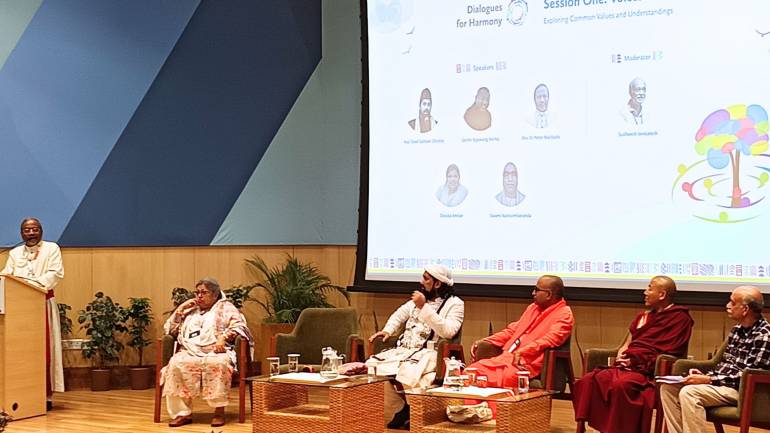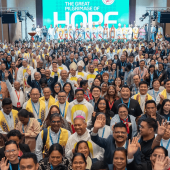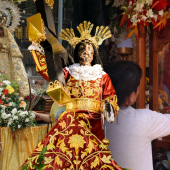Azim Premji University ventures into interfaith dialogue to create a peaceful, purposeful, and progressive civilization

Azim Premji, who is described as an entrepreneur, industrialist, philanthropist, the most famous Muslim, and a visionary leader, established the Azim Premji Foundation to create social change.
The Azim Premji Foundation holds most of Wipro's shares, specifically 66%. Azim Premji University, Bangalore, southern India, is a catalyst for the capacity development of civil society by creating public system professionals who can influence society through a wider range of programs and interventions in critical areas like early childhood education, inclusive education, disability, assessment, educational leadership, social sector leadership, and local democracy.
As the Azim Premji Foundation has already established itself in education and social transformation, it has now ventured into the slippery slope of interfaith dialogue to intervene creatively and collaboratively, bringing harmony and peace to society. As part of the process, more than 250 personnel in interfaith dialogue, social activists, professionals, and leaders from all the religions exhibited by the mosaic of different shades of saffron-clad Hindu Sanyasis, white-clad, mouth-closed Jain monks, Catholic priests and nuns, long-bearded Muslims belonging to Sunni, Shia, and mixed Sunni and Shia traditions, and yellow-clad Buddhist monks are the visible expression of unity in diversity and revealing the invisible God in visible forms.
The Dialogue for Harmony was inaugurated by a panel of five leaders from Muslim, Buddhist, Catholic, and Hindu leaders. The panel was composed of Haji Syed Salman Chishty, the Gaddi Nashi of Ajmer Sharif and Chairman of the Chishty Foundation; Geshe Ngawang Norbu, the Secretary of the Buddhist Institute, Geluk International Foundation, Mysore; Shaista Ambar, Founder of the All India Muslim Personal Law Board, a Muslim woman leader who established the first mosque for women; the Archbishop of Bangalore, Rev. Dr. Peter Machado; and Swami Narasimhananda, Secretary, Sri Ramakrishna Sevashrama, Kozhikode, Kerala. All expressed on the theme ‘Voices in Harmony: Exploring Common Values and Understanding,’ moderated by Sudheesh Venkatesh of the Azim Premji Foundation.
There was no video recording nor taping of the proceedings of the conference, so everyone expressed themselves without the fear of being recorded and exposed in public. Hence, everyone spoke from their hearts and brains without any inhibitions and prejudices. There were indeed refreshing voices of unity, equanimity, universality, and diversity all grounded on the illustrious tradition and heritage of India. For example, Archbishop Machado brought out the reality of India exporting software, artifacts, labor, and cuisine. Hence, he asked the question of why India does not export peace, harmony, non-violence, and truth.
Machado appealed to everyone to bring back the values inculcated by Gandhiji and other leaders who could gain independence for India through peaceful means and strategies. Machado meticulously attended all the sessions, was involved in interacting with the delegates, and emphasized through his presence the existential need for promoting dialogue and harmony in contemporary times, locally, nationally, and globally.
In the second session, Harmony in Action: Humanitarian Principles Across Spiritual Traditions was highlighted. Prof. Akhtarul Wasey, emeritus professor of Jamia Milia Islamia; Dr. Imam Umer Ahmed Ilyasi, chief imam of the All India Imam Organization; Jain Acharya Lokesh Muni, Jain leader and founder of Ahimsa Vishwa Bharati; Dr. Keshvaraj, who represented Sri Sri Sugunendra Theerthaswamiji of Udupi; and Father M. D. Thomas, MST, founder and director of the Institute of Harmony and Peace Studies, had spoken, and Varuni Bhatia AP Foundation moderated the session.
M. D. Thomas, a veteran who headed for many years the Interfaith Dialogue Centre at the Catholic Bishops’ Conference of India, spoke about common values that drive all religions. However, he stressed that the first one needs to be human, spiritual, and religious. All of these values are inextricably intertwined, and both the religious and spiritual aspects culminate in being humane. As he expressed through the text from the Bible, in the book of Genesis, God has created humans in His own image. There wasn’t any differentiation between the male and the female, the rich and the poor, the high and mighty with money and power, etc. So, he needs equality, justice, and peace to bring harmony.
In the evening, the cultural program served as the climax of the event. But just before the musical, a session termed "Dialogue with the Divine" featured interventions by Dr. Deepti Navartna that emphasized continuing the profound integration and connectivity initiated by Mahatma Gandhi. It was indeed an opportune time to rethink the Gandhian values that shaped the foundations of independent India. After this discussion, an ethereal musical recitation was conducted by Pandit Dr. Nagaraj Rao Havaldar, a Hindustani classical vocalist from Bangalore who raised the participants from the mundane towards the celestial in a dialogue through music.
On the second day, through the third session, highlighting harmony and hope, from dialogue to action, sharing the spirit of friendship, a six-member team of panelists exposed further action plans for harmony. Dr. Kerman Daruvalla from the Parzor Foundation enlightened the audience about the historical evolution of Parsi religion and spirituality.
Swami Shubhamritanandapuri, representing Sri Mata Amrutanadamayi Devi, spoke in detail about the exclusivist and inclusivist opposing views of integrating values and how one can promote peace and progress. According to him, often people involved in dialogue impose their religious or spiritual systems and reject all other forms.
On the other hand, the inclusivist tries to understand others and is ready to go the extra mile to accommodate and coexist. It would be significant to remember the call of Gabriel Marcel, the existential philosopher, in this context: “To exist is to co-exist and to co-exist is to pro-exist,” highlighting the relationality and mindfulness for others.
The session with the legendary film director Bharat Bala was unique and breathtaking. He introduced the audience to his short documentaries—videos on actions and visions like Vandematharam, Janaganamana, and Thalam—and spoke about the dream of perfection and bringing forth the uniqueness of India. Bharat Bala has the magic of integrating time, space, silence, and sounds in his films, leading us to an enchantment and raising us towards a crescendo.
He encourages them to watch his films and visit his website, thereby becoming ambassadors of cooperation, collaboration, and celebration. I encountered him, and thus, he revealed his passion for bringing out the best in India.
He further explained how ‘Thalam,’ a film on the boat race celebrated in the backwaters of Kerala, became a lesson in many of the management and leadership schools and a significant tool in training professionals. As Bala explained, the sound of the rhythm creates synchronicity, effective synchronicity drives speed, and speed leads to success, in everyday lived experiences. The concluding remarks of the conference were given by Narayani Ganesh, the writer of the serial "Speaking Tree" in the Times of India, along with Anurag Behar, the first Vice Chancellor of Azim Premji University and its present CEO.
The salubrious climate of Bangalore, with its artistic, eco-friendly, and pedestrian-friendly campus of Azim Premji designed by the legendary architect and urban planner Chris Benninger, was the most ideal place for celebrating unity in diversity and reverberating harmony. Azim Premji University's very efficient planning and execution of Dialogues for Harmony marks a significant milestone in our journey towards harmony and peace, as they have taken the lead in fostering enduring peace among various religions and cultural traditions, thereby fostering India's progress.
The conception of universities is that they exist to create platforms or ideas put together pluralistically to create an atmosphere of conviviality. The university and the Azim Premji Foundation placed enormous resources and efforts to achieve social harmony in India, a land composed of villages and cities with a mosaic of religions, languages, cultures, traditions, cuisines, and diversities celebrating unity. Hearty congratulations to the organizers, the Azim Premji University and Foundation. It seems to be the first time that the corporations have attempted to promote peace, harmony, and progress.
By Prof. Dr. Mathew Chandrankunnel, CMI
Radio Veritas Asia (RVA), a media platform of the Catholic Church, aims to share Christ. RVA started in 1969 as a continental Catholic radio station to serve Asian countries in their respective local language, thus earning the tag “the Voice of Asian Christianity.” Responding to the emerging context, RVA embraced media platforms to connect with the global Asian audience via its 21 language websites and various social media platforms.














